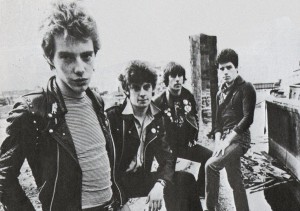Jon Hamblin, Jacob Kotler, and Tim Maloney
A study of Northern Ireland might cause Americans to pause and reflect about their own ghettoes, to wonder what could happen in a land where, 40 percent of black teenagers were out of work.
-John Conroy
Every time you clock in the morning, I feel you just want to kill
All my innocence while ignoring my purpose to preserve as a better person
I know you heard this and probably in fear…
-Kendrick Lamar
This project utilizes two albums to examine different responses to states of oppression–one from hip-hop and another from punk.
The hip-hop album in our study is Kendrick Lamar’s 2012 album “Good Kid, m.A.A.d City”–an album that was heralded by critics for its complex, creative, and detailed interpretation of life in Compton, California. Kendrick details the city’s police and gang violence, his tendency to be peer pressured, and his adoration for Compton, knowing that aside from the violence, his home was a crucial factor in developing his character. “Good Kid, m.A.A.d City” has been championed for its homage to early 90s hip-hop, considered by many to be the genre’s golden age. The record is known for its “authentic” hip-hop sound and seen as a continuation of an African-American narrative that tackles the complexity of race.
The punk we look at is Stiff Little Fingers’ 1979 album “Inflammable Material.” “Inflammable Material” is considered by many punk enthusiasts a quintessential punk record. The album, like Lamar’s record, details experiences growing up in a violent urban setting: Belfast, Northern Ireland. However, compared to other punk bands that tend to be more nihilistic about their environments, Stiff Little Fingers had pride for Belfast, their songs reminder listeners they have the agency to alter Northern Irish reality. “Inflammable Material,” while also dealing with the violent Northern Irish Troubles, used punk as a vehicle to criticize and impacted how listeners inside and outside of Northern Ireland understood Belfast.
It is our intention that this study will yield a more complicated and varied understanding to the dynamics of oppression and the artistic responses to it. However, we want to avoid a horizontal analysis of these albums. We realize there are several differences between America’s racially-charged discrimination and Northern Ireland’s religious-based conflict between Irish nationalists and Northern Irish unionists. Moreover, we also understand that these two albums are single interpretations of incredibly rich and historic conflicts.
Therefore, for our project, we have chosen a few songs from Lamar’s “Good, Kid m.A.A.d City” and Stiff Little Finger’s “Inflammable Material,” highlighting several themes we believe allow a better understanding of these conflicts and, most importantly, the nature of oppression. These themes include physical violence, identity, heritage, authenticity, masculinity, and isolation.
To avoid a side-by-side analysis our project is designed in a web format. Each song page will reference lyrics and contain an analysis of the material using historical evidence and other media to support our ideas. Pages will also include hyperlinks that connect songs together via similar themes. The hyperlinks will give you an option to either look at a different song by Lamar or Stiff Little Fingers, giving the reader a much more interactive experience with the content. Thus, our project is a vehicle to introduce these themes and not interpret them. These albums are art and there can be no catch-all argument that addresses their intricacies. We believe by framing the study as a web we can give readers their own interpretation of these complex songs and the subject of oppression and urban conflict.
Now, we will introduce the songs.


